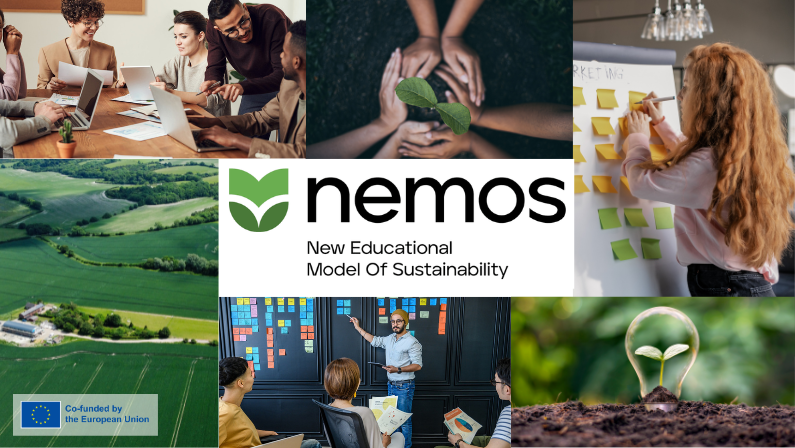
From: COPE Pamplona Radio – Ciencia
Aired on: 29 November 2023
Language: Spanish
Interviewed by COPE Pamplona radio, professor of Food Technology at the Public University of Navarra (UPNA), María J. Cantalejo Díez explains the innovative methodology promoted by the Erasmus+ project NEMOS – A new educational model for acquisition of sustainability competences through service-learning.
An educational innovation project, NEMOS encourages the adoption of service-learning as a green pedagogy to integrate sustainability in the higher education curricula. With the aim to include a social element in the students’ learning path, NEMOS introduces service-learning as an experiential methodology by which students get in direct contact with social agents such as micro-enterprises, NGO’s and other stakeholders, and understand their challenges.
If, on the one hand, this mutual exchange helps raising the student’s awareness of the social reality they leave in; on the other hand, as a practical approach, it allows them to contribute sustainable solutions to the stakeholders’ challenges. As a result, this hands-on learning process stimulates a general change in the students’ mindset towards more environmentally, socially and economically sustainable models and practices.
To this end, the five universities involved in the project (Public University of Navarra – Spain; Technological University Dublin – Ireland; Technological University Graz – Austria; Rhône-Alpes Higher Institute of Agriculture – France; University of Pisa – Italy) have been successfully complementing several compulsory courses with service-learning activities, observing a high level of receptiveness in the participating students, lecturers and stakeholders.
As an example, the Public University of Navarra conducted an activity on paper composting and its use as bread packaging within the Food Design and Development course of the of the Degree in Food Product and Process Innovation. A pilot was carried out in collaboration with Pamplona City Council and the Tajo Social’s printing, that employs people in a situation of social exclusion. As for the service part, students were called to develop a new compostable packaging product to be manufactured in the Tajo Social plant. As for the learning, both social and environmental sustainability competences of the students were reinforced by enhancing their knowledge on sustainable materials and allowing them to contribute to the integration into society of the Tajo Social’s workers.
Given the crucial role of lecturers in this process, a fundamental part of the NEMOS project is related to the training of the teaching staff, both in sustainability and the service-learning methodology. Support is thus provided to, first of all, raise their awareness on the concerned topics, and then help them put that knowledge into practice.
Launched as a pilot in the food degrees of the five European universities involved, the NEMOS project promotes a model to be adapted and implemented in further higher education disciplines, as well as throughout the educational system, including primary, secondary and vocational education and training.
Although very ambitious and challenging, as it requires a strong engagement of all the actors involved, the NEMOS project’s mission is to respond to the immediate need of supporting a more sustainable future: “Education is an important driver of change to shift to a more sustainable mindset and reverse our unsustainable practices,” concludes professor Cantalejo Díez.
To make this difficult task possible, it is paramount to build on the current NEMOS consortium and create a huge international network of likeminded actors who work together towards the same objectives.
About the NEMOS project
The NEMOS project acknowledges sustainability as an increasingly crucial skill for graduate and post-graduate students to tackle important global challenges such as climate change, food waste and the loss of biodiversity in their professional future. Therefore, the project aims to define a new educational model to integrate sustainability competences in the curricula of food-related degrees by means of service learning.
Co-funded by the Erasmus+ programme of the European Union, the NEMOS project is led by the Public University of Navarra and includes the following consortium partners: Technological University Dublin (Ireland); Technological University Graz (Austria); Rhône-Alpes Higher Institute of Agriculture (France); University of Pisa (Italy); and IGCAT.
More information at www.nemosproject.com


